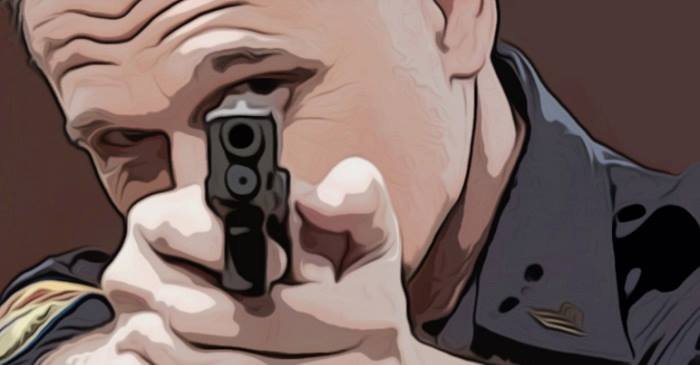
Last week, the Supreme Court dealt another blow to police accountability in the United States.
In a 7-2 ruling in Kisela v. Hughes, a majority of Supreme Court justices decided that police officer Andrew Kisela of the University of Arizona Police Department could not be sued for shooting Amy Hughes, who was holding a knife at the time of the shooting but was not threatening anyone.
In 2010, three officers responded to a call that Hughes was behaving erratically, hacking at a tree using a knife. Hughes ignored Kisela’s command to drop the knife, though she was reportedly calm and did not move to attack anyone. Kisela then shot her four times.
Though after the fact it was revealed Hughes, who has a history of mental illness, had threatened to kill her roommate’s dog over a small debt, the officers did not know this at the time. Nevertheless, despite her calm demeanor, the officers all confirmed they believed she posed a threat.
In an affidavit filed by the roommate and cited a case summary published by Cornell Law, Sharon Chadwick, “she did not feel endangered at any time…Based on her experience as Hughes’ roommate, Chadwick stated that Hughes ‘occasionally has episodes in which she acts inappropriately,’ but ‘she is only seeking attention.’”
Hughes eventually sued Kisela, alleging the use of excessive force, and a 9th circuit court ruled in 2016 that a “rational jury could find that [Hughes] had a constitutional right to walk down her driveway holding a knife without being shot.” But last week, the Supreme Court sided with the officer. The Los Angeles Times summarized how difficult it has become to sue police officers:
“Since the Civil War, federal law has allowed people to sue government officials, including the police, for violating their constitutional rights. But in recent years, the Supreme Court has erected a shield of immunity for police and said officers may not be sued unless victims can point to a nearly identical shooting that had been deemed unconstitutionally excessive in a previous decision.”
A criticism of the decision by Emma Anderson of the Criminal Law Reform Project that was published by the ACLU discussed the notion of “qualified immunity,” which has become a major factor in the difficulty that comes with holding officers accountable:
“Essentially, if you want to sue a police officer who you think violated your constitutional rights, you first have to convince the court that what happened to you was so outrageous that no reasonable person could have thought it was okay.”
In her dissenting opinion, Justice Sotomayor argued that “palpably unreasonable conduct will go unpunished” and that the ruling condoned a “shoot first and think later” attitude.
“If this account of [the officer’s] conduct sounds unreasonable,” she wrote, “that is because it was. And yet, the Court … insulates that conduct from liability under the doctrine of qualified immunity.”
As Anderson noted, “qualified immunity has become a misnomer. It should be called what it is, as Justices Sotomayor and Ginsberg did in their dissent from last week’s opinion. It is an ‘absolute shield.’”
Noting that qualified immunity “contributes to the deep deficit in police accountability throughout our country” that disproportionately affects minorities, Anderson concluded:
“The result of the court’s decision is clear. Our right to not be unreasonably shot by the police is less protected, and therefore less important, than the court’s interest in shielding police officers from civil liability for their abuses of authority.”
My Links:
Patreon: https://www.patreon.com/CareyWedler
Anti-Media: http://theantimedia.org/author/careyw1/
Youtube: https://www.youtube.com/channel/UCs84giQmEVI8NXXg78Fvk2g
Instagram: https://www.instagram.com/careywedler
Facebook: https://www.facebook.com/CareyWedler/
Twitter: https://twitter.com/careywedler
I side with the police on this one. The electorate in the United States has become so fucking stupid. They think like children. Look at this as adult men and women who have some clue about what it's like to be a police officer.
The important facts about the incident are that you have five things mixed together that can't be mixed: (1) police officers with guns, confronting a suspect who they do not know (2) who is armed with a knife, and (3) who is behaving abnormally and unpredictably and (4) who is refusing to disarm and, holding the knife, (5) is refusing to obey orders.
I'm not saying that the shooting was justified. What I am saying is that it is always going to be dangerous to hold a weapon in front of a police officer while refusing to put the weapon down and while acting unpredictably.
IOW, it is dangerous to be mentally ill. The dangers of being mentally ill are comparable to the dangers of being totally blind while walking down the sidewalk. Shit happens, and to some extent that's just the way it has to be.
Finally, looking at it in financial terms, making it harder to sue a police officer will make it easier and less expensive to attract better candidates to apply for the job. It could well result in smarter officers who make fewer bone headed decisions under pressure.
Supreme to against crime.
Keep fighting Carey.
And where is the police man's march over this?
Any thinking police man would think, if there is no legal recourse to police action, then there WILL come a point where the recourse is to have no police.
The police men would look into history books and see that ALL police states end with the police being dead. And thus, any thinking police man would work to head this inevitability off.
To bad. The govern-cement now considers your property rights do not apply to them. Another nail in the coffin.
Well, history has repeated enough times. I pray that this time police will read Gulag Archipelago and understand before its too late.
Relevance: Sharing the truth.Curated for #informationwar (by @wakeupnd)